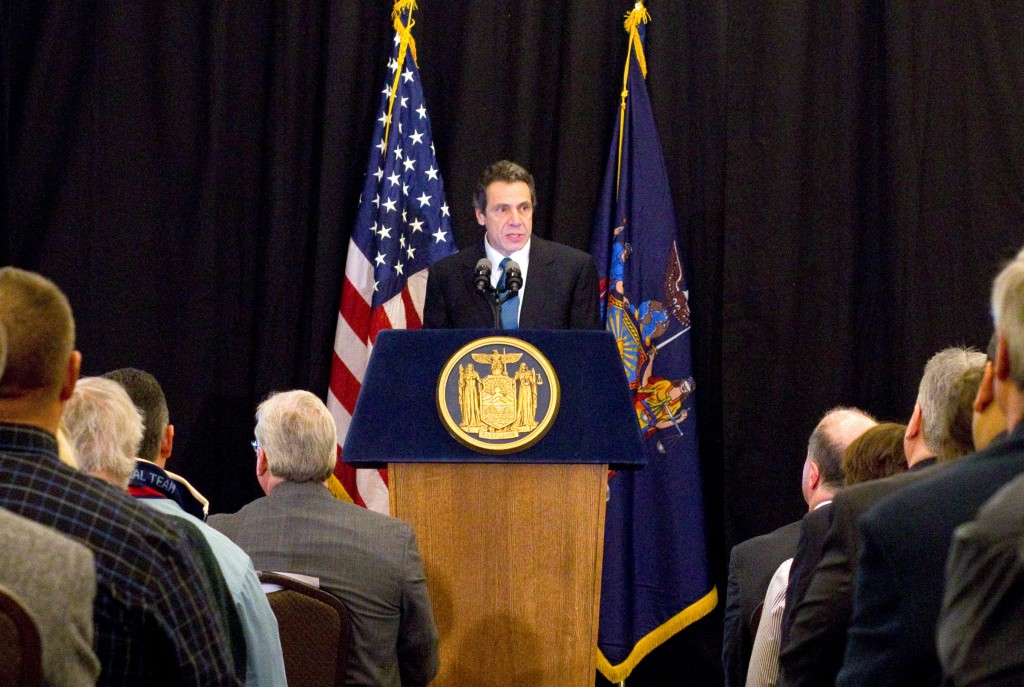
New York state education officials and the state teachers’ union agreed on a new system last month for teacher evaluations based on students’ test scores and administrator observations.
Gov. Andrew Cuomo threatened to impose his own evaluation system if the two sides did not reach an agreement by Thursday night. Union representatives and Department of Education employees reached a compromise, putting an end to two years of quibbling since the original evaluation system was drafted in 2010, according to Feb. 16 report in The New York Times.
The establishment of a state teacher evaluation fulfills one of the requirements stipulated by the federal Race to the Top program, which granted New York $700 million in federal aid for education.
Under the new agreement, up to 40 percent of a teacher’s evaluation will be based on students’ state testing scores, while the remaining 60 percent will be based primarily on classroom observations, which will include at least one unannounced visit.
Each teacher will have a composite score, and will be ranked into four categories: highly effective, effective, developing and ineffective. The Times’ report said the previous evaluation system only had two categories — satisfactory and unsatisfactory.
James Carpenter, an associate professor at Binghamton’s Graduate School of Education, said curriculum should ensure good teaching methods that do not focus solely on maximizing students’ test scores.
“We’re going to stick to our ideals and hopefully continue to produce teachers that are able to teach effectively,” Carpenter said. “There are teachers who continue to teach effectively without concern for test scores.”
Carpenter said teachers from Binghamton University learn to develop engaging, hands-on lessons that make the material more relatable to students’ interests. He said teachers who make the material applicable will lead their students to high scores without teaching to the test.
However, Carpenter said he does not think it is fair to evaluate teachers based on the performance of others.
“It’s like trying to evaluate a physician on how the patient performs,” he said. “If the patient doesn’t take the medication or go to rehab, that hurts the recovery process, but you don’t blame the doctor for that.”
The evaluations may be less effective if they are used only to measure a teacher’s competence rather than provide teachers with strategies to improve, according to Carpenter.
“If observation is used in ways to make the teaching and learning process better, then I’m all for it,” Carpenter said. “But if it’s being used to hold the guillotine over the teacher’s head, then I don’t support it.”
Brittany Steib, BU alumna who graduated with a Masters of Arts in teaching in social studies in 2011, was also skeptical of the process because student test results can be unpredictable.
“If little Suzy just broke up with her boyfriend and went into that exam and flunked it because she was so upset … it’s my butt that is on the line because calculations predicted she should have scored in the 80s,” Steib said.
Caitlin Thompson, a student in the Graduate School of Education studying for her certification in literacy, said that many of the history teachers she knows are so worried about the new evaluation system that they have resorted to teaching only the material on the test at the cost of leaving out other significant information, such as current events.
“Time is the largest concern,” Thompson wrote in an email. “Teachers feel that they do not have enough time to cover all the material, let alone teach it.”
Sara Maliwacki ‘08, a third-year history teacher at Windsor High School, said she focuses on teaching students the skill set necessary for students to think critically about history, although the New York Regents Exams determine, to some extent, the content of material.
“Certainly if we didn’t have [document-based questions] on the global studies regents, would we still be doing DBQs?” Maliwacki asked. “Probably not.”
The formal emphasis on student test scores may make it harder for student teachers to find placement, according to Adam Laats, an assistant professor in the Graduate School of Education.
“Teachers may have a harder time handing over the reigns of their class [to student teachers] if they know they are being evaluated by their students’ test scores,” Laats said.
Maliwacki said she still remains confident in the abilities of student-teachers to be effective with the guidance of more experienced teachers.
“I have a student-teacher right now and they’re doing fabulous,” Maliwacki said. “If I were to notice that students just weren’t understanding the material, I may step back into the classroom a little.”
However, she added that it may be difficult to gain experience closer to testing time.
“I think in the spring, when the students are gearing up for the regents, it may make the student-teaching experience more artificial,” Maliwacki said.
Laats said the new teacher evaluation system may not lead to major changes in the classroom because of New York’s long history of high stakes for standardized testing.
“For teachers in an institution like this, they’ve always been aware of student testing,” Laats said.


